2013人教版七下英语Unit 4 Don't eat in class复习题
- 格式:doc
- 大小:78.00 KB
- 文档页数:4
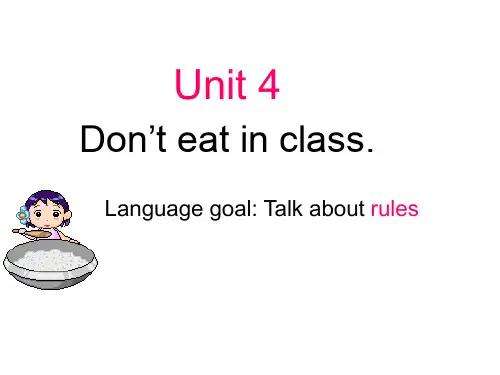
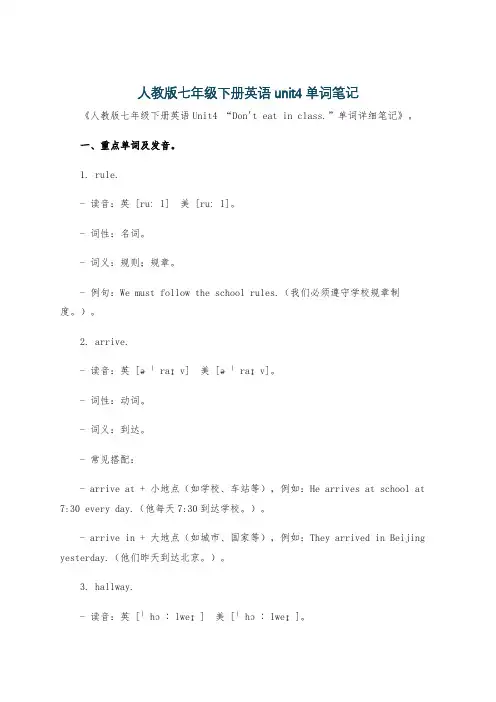
人教版七年级下册英语unit4单词笔记《人教版七年级下册英语Unit4 “Don't eat in class.”单词详细笔记》。
一、重点单词及发音。
1. rule.- 读音:英 [ruːl] 美 [ruːl]。
- 词性:名词。
- 词义:规则;规章。
- 例句:We must follow the school rules.(我们必须遵守学校规章制度。
)。
2. arrive.- 读音:英 [əˈraɪv] 美 [əˈraɪv]。
- 词性:动词。
- 词义:到达。
- 常见搭配:- arrive at + 小地点(如学校、车站等),例如:He arrives at school at 7:30 every day.(他每天7:30到达学校。
)。
- arrive in + 大地点(如城市、国家等),例如:They arrived in Beijing yesterday.(他们昨天到达北京。
)。
3. hallway.- 读音:英 [ˈhɔːlweɪ] 美 [ˈhɔːlweɪ]。
- 词性:名词。
- 词义:走廊;过道。
- 例句:Don't run in the hallway.(不要在走廊里奔跑。
)。
4. fight.- 读音:英 [faɪt] 美 [faɪt]。
- 词性:动词/名词。
- 词义:- 作动词时,意为“打架;战斗”,例如:The two boys often fight.(这两个男孩经常打架。
)。
- 作名词时,意为“打架;战斗”,例如:There was a fight between the two groups.(这两个团体之间发生了一场争斗。
)。
5. sorry.- 读音:英 [ˈsɒri] 美 [ˈsɑːri]。
- 词性:形容词。
- 词义:抱歉的;对不起的;惋惜的。
- 常见搭配:- be sorry for(因……而抱歉),例如:I'm sorry for being late.(我为迟到而抱歉。
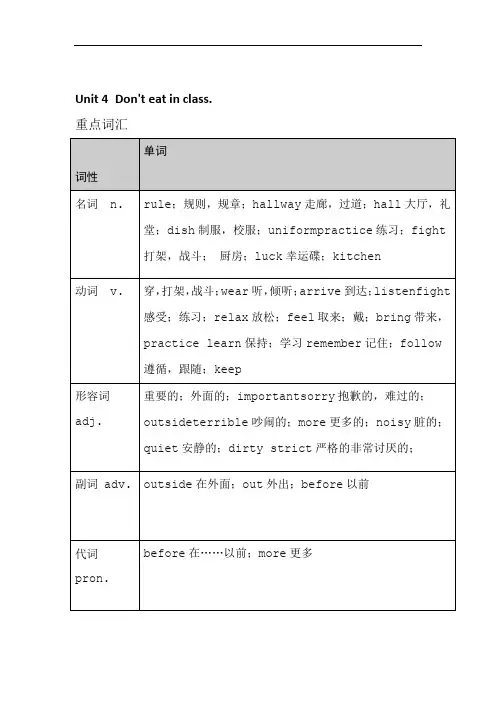
Unit 4Don't eat in class. 重点词汇重点短语Section A1.in class在课堂上2.arrive late for class=be late for class上课迟到3.on time准时4.in the hallways在走廊里5.in the dining hall在餐厅里6.listen to听7.at school在学校8.be late迟到9.music player音乐播放器10.bring...to school 把……带到学校来不得不做have to do.11.12.wear a school uniform穿校服13.be quiet安静Section B14.go out外出15.on school nights在上学期间的晚上16.practice the guitar练吉他17.do the dishes清洗餐具18.make breakfast做早饭19.make one's bed整理床铺20.leave sth.in...把……丢在……里21.read a book看书22.think about考虑23.make rules制订规则24.follow the rules遵守规则25.Good luck!祝好运!26.keep sth.+adj.使……保持……状态重点句型1.Don't eat in class.在课堂上不准吃东西。
2.Don't arrive late for class.You must be on time.不准上课迟到,务必守时。
3.Don't run in the hallways.不准在走廊内乱跑。
4.Don't eat in the classroom.You must in the dining hall.不准在教室里吃东西,务必在餐厅里吃东西。
5.Don't listen to music in class.不准在课堂上听音乐。
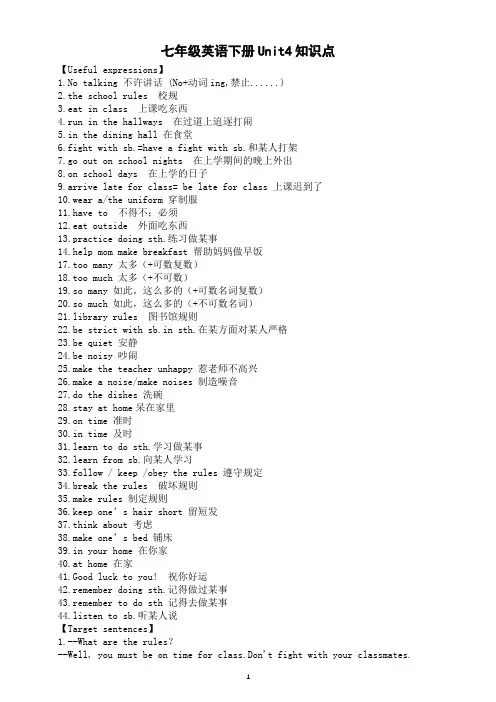
七年级英语下册Unit4知识点【Useful expressions】1.No talking 不许讲话 (No+动词ing,禁止......)2.the school rules 校规3.eat in class 上课吃东西4.run in the hallways 在过道上追逐打闹5.in the dining hall 在食堂6.fight with sb.=have a fight with sb.和某人打架7.go out on school nights 在上学期间的晚上外出8.on school days 在上学的日子9.arrive late for class= be late for class 上课迟到了10.wear a/the uniform 穿制服11.have to 不得不;必须12.eat outside 外面吃东西13.practice doing sth.练习做某事14.help mom make breakfast 帮助妈妈做早饭17.too many 太多(+可数复数)18.too much 太多(+不可数)19.so many 如此,这么多的(+可数名词复数)20.so much 如此,这么多的(+不可数名词)21.library rules 图书馆规则22.be strict with sb.in sth.在某方面对某人严格23.be quiet 安静24.be noisy 吵闹25.make the teacher unhappy 惹老师不高兴26.make a noise/make noises 制造噪音27.do the dishes 洗碗28.stay at home呆在家里29.on time 准时30.in time 及时31.learn to do sth.学习做某事32.learn from sb.向某人学习33.follow / keep /obey the rules 遵守规定34.break the rules 破坏规则35.make rules 制定规则36.keep one’s hair short 留短发37.think about 考虑38.make one’s bed 铺床39.in your home 在你家40.at home 在家41.Good luck to you! 祝你好运42.remember doing sth.记得做过某事43.remember to do sth 记得去做某事44.listen to sb.听某人说【Target sentences】1.--What are the rules?--Well, you must be on time for class.Don't fight with your classmates.2.We can’t listen to music in the classroom or hallways.3.--Can we bring music players to school?--Yes, we can./No, we can’t.4.And we always have to wear the school uniform.5.--Does he have to wear a uniform at school?--Yes, he does./No, he doesn't.6.--What do you have to do?--We have to be quiet in the library.7.Don't leave the dirty dishes in the kitchen.8.My dad says I can’t play basketball after school because I must do my homework.9.After dinner, I can’t relax,either.I must read a book before I can watch TV.10.I know how you feel.11.There are a lot of things you can do.12.Parents and schools are sometimes strict but remember, they make rules to help us.13.I think it’s best to follow the rules.14.I can’t go out on school nights.15.I have to do my homework after school.16.I must practice the guitar before dinner.【Language points】1.Don’t arrive late for class.(1)arrive v.到达;是不及物动词,若接地点名词,要加介词in或at。
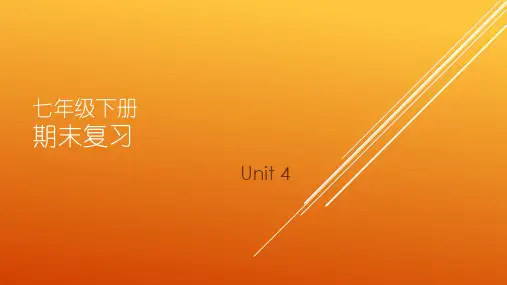
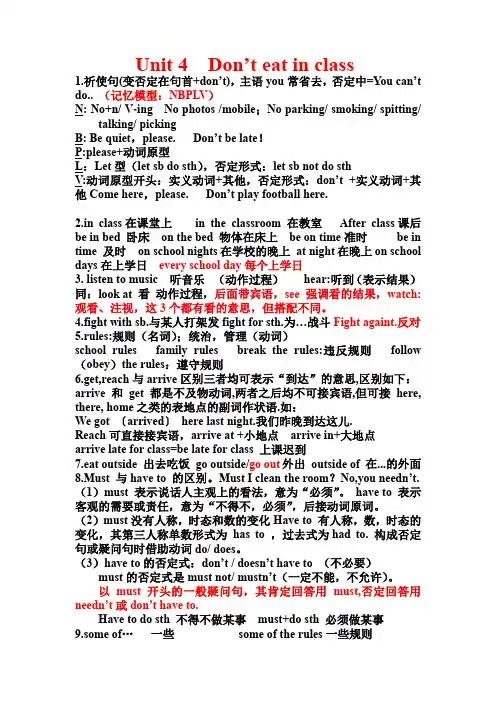
Unit 4 Don’t eat in class1.祈使句(变否定在句首+don’t),主语you常省去,否定中=You can’t do.. (记忆模型:NBPLV)N: No+n/ V-ing No photos /mobile;No parking/ smoking/ spitting/ talking/ pickingB: Be quiet,please. Don’t be late!P:please+动词原型L:Let型(let sb do sth),否定形式:let sb not do sthV:动词原型开头:实义动词+其他,否定形式:don’t +实义动词+其他Come here,please. Don’t play football here.2.in class在课堂上in the classroom 在教室After class课后be in bed 卧床on the bed 物体在床上be on time准时be in time 及时on school nights在学校的晚上at night在晚上on school days在上学日every school day每个上学日3. listen to music 听音乐(动作过程)hear:听到(表示结果)同:look at 看动作过程,后面带宾语,see 强调看的结果,watch:观看、注视,这3个都有看的意思,但搭配不同。
4.fight with sb.与某人打架发fight for sth.为…战斗Fight againt.反对5.rules:规则(名词);统治,管理(动词)school rules family rules break the rules:违反规则follow (obey)the rules:遵守规则6.get,reach与arrive区别三者均可表示“到达”的意思,区别如下:arrive 和get都是不及物动词,两者之后均不可接宾语,但可接here, there, home之类的表地点的副词作状语.如:We got 〔arrived〕here last night.我们昨晚到达这儿.Reach可直接接宾语,arrive at +小地点arrive in+大地点arrive late for class=be late for class 上课迟到7.eat outside 出去吃饭go outside/go out外出outside of 在...的外面8.Must 与have to 的区别。
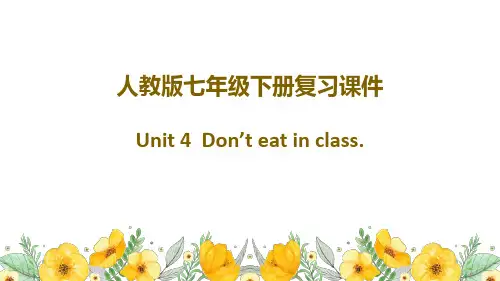
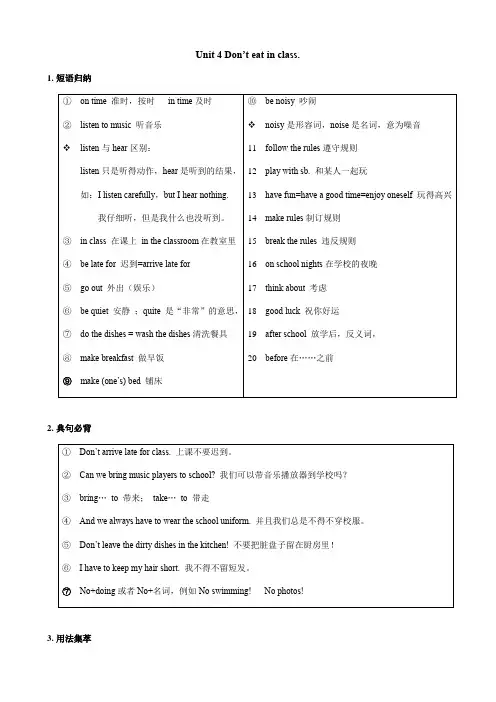
Unit 4 Don’t eat in class.1.短语归纳2.典句必背3.用法集萃(1)Don’t arrive late for class. 不要上课迟到❖arrive in❖arrive at(2)You must be on time. 你必须准时。
❖on time是固定搭配,意为“按时;准时”。
例:Don’t worry. The train will arrive on time. 别担心。
火车会准时到达的。
❖常见的time短语(3)Don’t listen to music in class. 不要上课时听音乐牛刀小试—Do you like the songs by Taylor?一Yes. Country music ______ nice and full of feelings.A. SoundsB.listensC. hearsD. looks(4)This is very important. 这是很重要的❖important作形容词,意为“重要的”。
如:The first lesson is very important. 第一课是很重要的❖反义词:unimportant adj. 不重要的❖派生词:importance n. 重要;重要性(5)Can we bring music players to school? 我们可以把音乐播放器带到学校里来吗?❖bring作动词,意为“带来;拿来”例:Don’t forget to bring your homework here. 不要忘记把你的家庭作业带过来❖辨析bring, take, carry和get牛刀小试Don’t forget _____ your photos here when you come to school.A.bringingB. to takeC. takingD. to bring(6)Oh, and we also have to be quiet in the library. 哦,我们在图书馆里还必须保持安静❖quiet作形容词,意为“安静的”,可以用来修饰人,也可以用来形容地点或场所等。
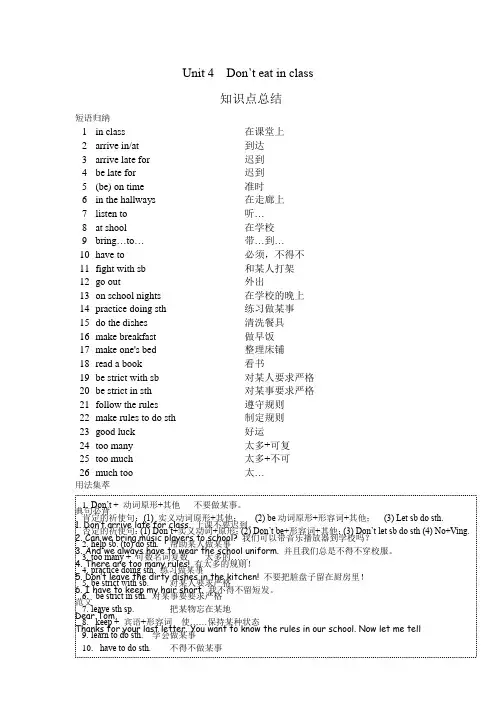
Unit 4 Don’t eat in class知识点总结短语归纳1in class 在课堂上 2arrive in/at 到达 3arrive late for 迟到 4be late for 迟到 5(be) on time 准时 6in the hallways 在走廊上 7listen to 听 (8)at shool 在学校 9bring...to... 带...到 (10)have to 必须,不得不 11fight with sb 和某人打架 12go out 外出 13on school nights 在学校的晚上 14practice doing sth 练习做某事 15do the dishes 清洗餐具 16make breakfast 做早饭 17make one's bed 整理床铺 18read a book 看书 19be strict with sb 对某人要求严格 20be strict in sth 对某事要求严格 21follow the rules 遵守规则 22make rules to do sth 制定规则 23good luck 好运 24too many 太多+可复 25too much 太多+不可 26 much too 太…用法集萃 典句必背 1. Don’t arrive late for class. 上课不要迟到。
2. Can we bring music players to school? 我们可以带音乐播放器到学校吗? 3. And we always have to wear the school uniform. 并且我们总是不得不穿校服。
4. There are too many rules! 有太多的规则! 5. Don’t leave the dirty dishes in the kitchen! 不要把脏盘子留在厨房里! 6. I have to keep my hair short. 我不得不留短发。

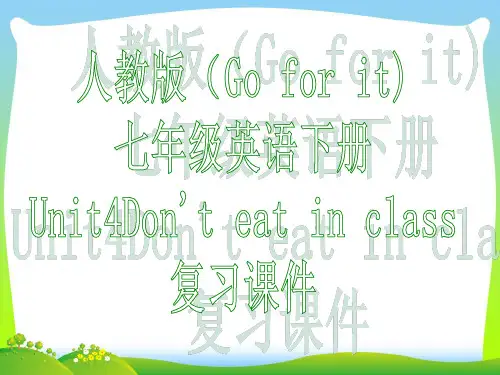
Unit 4 Don’t eat in class一、重点词组及短语1。
school rules 学校规章制度17。
share (sth.)with sb。
和某人分享2. break the rules 违反规章制度18. make (up)ruler 制订规则3。
fallow/keep the rules 遵守规章制度19。
learn to do sth. 学(做某事)4. arrive late for class = be late for class20. on school days在上学期间上课迟到5。
dining hall饭厅,餐厅21。
on school nights在校期间的晚上6。
in class 在课堂上22. practice (playing) the piano 练习弹钢琴7。
on time准时(in time及时)23。
go out外出8. eat in the classroom 在教室里吃东西24. see friends看望朋友9. wear a hat (hats) 戴帽子25. clean (one’s)room打扫房间10。
listen to music 听音乐26. do the dishes洗餐具11。
school uniforms校服27. too many/much太多的(可数/不可数)12。
wear uniforms穿制服28。
make (one’s) bed铺床13。
I see我明白了29. go to bed去睡觉(be in bed 在床上)14. have to do sth。
不得不做30. think about=think of 考虑、认为15。
be(keep)quiet保持安静31. be strict (with sb.)对某人)要求严格16。
according to根据,依据32. Don’t talk. = No talking.不要说话二、知识点解析1. Don’t fight. 不要打架.fight作动词,意为“打架、打仗”。
复习Unit 4 Don't eat in class.Name: Class:重点短语1. have to 不得不2. (be) on time 准时3. wear a uniform 穿制服4. by ten o’clock 到十点为止5. be/arrive late late for... ...迟到6. in the hallways 在走廊里7. listen to...听... 8. in the dining hall 在餐厅9. do the dishes清洗餐具10. eat outside在外面吃11.follow/keep/obey the rules 遵守规则;break the rules 破坏/违反规则12. help sb.(to) do sth.; help sb. with sth. 帮助某人做某事13.make dinner 做饭14. be strict (with sb.) (对某人)要求严格15. on school nights 在上学日的晚上16. make (one’s) bed 铺床17. too many rules 太多的规则18. be in bed 上床睡觉19. on weekends/on the weekend 在周末时经典句型1.Don’t run in the hallways. 不要在走廊上跑步。
2.Don’t fight. 不要打架。
3.-What are the rules? 有什么规则?-We must be on time for class. 我们上课必须准时。
4.-Can we eat in the classroom? -No, we can’t, but we can eat in the dining hall.5.-Does he have to wear a uniform at school? -Yes, he does./No, he doesn’t.6.-What do you have to do? -We have to be quiet in the library.7.Don’t leave the dirty dishes in the kitchen! 别把脏碗留在厨房里!8.After dinner, I can’t relax either. 晚饭后我也不能放松。
9.There are a lot of things you can do. 有许多你可以做的事情。
难点解析(前两点要掌握,后面三点理解)1. 当祈使句为Let’s…时反意疑问句总是用shall we:Let’s phone her now, shall we? 我们现在就给她打电话,好吗?Let’s go to the cinema tonight, shall we? 今晚咱们去看电影,好吗?2. 当祈使句为Let us…时若表示请求,反意疑问句用will you,若表示建议,反意疑问句用shall we:Let us know your address, will you? 请把你的地址告诉我们,好吗?Let us go swimming together, shall we? 我们一起去游泳好吗?3. 若陈述部分为祈使句,反意疑问句通常用will you, won’t you, would you等:Mail the letter today, will you? 今天就把信发掉,好吗?Try to be back by two, won’t you? 设法两点之前回来,好吗?If you want help, let me know, would you? 如果你需要帮助,告诉我,好吗?4. 若陈述部分为否定式,则反意疑问句部分只用will you:Don’t forget to post the letter, will you? 请别忘了寄信。
5. 有时根据语境的需要,反意疑问句也可以用can you, can’t you 等:Give me some cigarettes, can you? 给我些香烟,可以吗?Walk faster, can’t you? 走快点,不行吗?一、完成句子。
1.Don’t (打架) with others.2.What (其它) do you want to say?3.I wore a (校服) for gym class yesterday.4.Don’t eat meals in the (走廊) .5.The teacher told me (not be) late again.6.No (talk) in class.7.Don’t stand o________, please come in.8.What are the r________ in your family? Can you stand them?9.She (have) to be in bed by ten o’clock.10.Don’t talk l________, that baby is asleep.二、翻译下列短语1. 迟到2. 违反规则3. 准时4. 不得不5. 遵守规则6. 到5点钟为止7. 铺床8. (对某人)要求严格9. 清洗餐具10. 太多三、翻译句子1. 不要在床上看书。
.2. 不要和你的父母吵架。
.3. 我们上课一定要准时吗?.4. 因为他总是有太多的家务活要做,所以他从不开心。
.5. 她爸爸对她很严格。
.四、单项选择( )1. -Must I go home? -No, you ________.A. can’tB. mustn’tC. have toD. needn’t( )2. Our teachers are strict________ us, so we have many rules to follow.A. withB.inC. onD. to( )3. Mrs. White asked her son ________ with water.A. not playB. don’t playC. not to playD. don’t to play ( )4. She was ________ tired because she did ________ housework today.A. too much; too manyB. much too; too muchC. too much; too muchD. too many; too much( )5. We have to get to the bus station ________ 6 o’clock, or we’ll be late.A.onB. inC. byD. for( )6. We have to ________ uniforms at school.A. wearB. wearsC. put onD. puts on( )7. She has to help her mom ________ dinner today.A. makesB. MakingC. madeD. make( )8. It’s too dark. I ________ go home.A. canB. have toC. needD. may( )9.-Let’s go dancing tonight. -Sorry, I ________. I have to go to my guitar lesson.A. mustn’tB. needn’tC. can’tD. don’t( )10. -________ in class. You can listen to it after class. -Sorry, Miss Liu.A.Don’t runB. Don’t listen to musicC. Don’t eatD. Don’t sing五、完型Every school has its own rules. How many 1 are there in your school? At some schools, the students 2 to wear uniforms on school days. But many students don’t like to wear uniforms. They think the uniforms are the ugliest 3 in the world. But the school d on’t allow students to wear 4 own clothes at school. So some students draw cartoons or some famous singers on their 5 . They think it is very 6 that everyone wears the same. It is very unfair(不公平的) that teachers and students are wearing 7 . But most of the students 8 the rules. What do you think 9 it? Do you 10 your school uniforms?( )1. A. students B. rules C. uniforms D. rulers( )2. A. has B. must C. should D. have( )3. A. clothes B. shirts C. skirts D. cloth( )4. A. their B. they C. them D. themselves( )5. A. school bags B. books C. uniforms D. desks( )6. A. bored B. boring C. interesting D. interested( )7. A. same B. differently C. different D. the same( )8. A. obey B. agree C. listen D. listen to( )9. A. of B. over C. by D. for( )10. A. like B. make C. wash D. put on六、阅读AScott drives a bus through busy streets all day. He is always happy. And the people on his bus seem (好像) to be happy, too.One morning, Scott started his big yellow and blue bus. At the first bus stop many people got on the bus. When he drove on, he began talking, “It is seven now. The sky is blue. It will not rain today. We all like sunshine(阳光), don’t we?”At one stop a very old man got on. “This boy will be good to give you his seat!” The boy’s face turned red. He stood up at once.“Most people want to be nice,” Scott told the old man. “They want to do the right things. But sometimes they need a push (推动). So I just give them one.” Scott always sings his own song, “I love you, Mr. Sunshine. I love you, Mr. Sun. In the world I love you best. You are the only one.”( ) 1. The story tells us Scott .A. likes to push peopleB. has nothing to worry aboutC. is always ready to help peopleD. sometimes helps the old man( ) 2. People on Scott’s bus seem to be happy because .A. Scott’s bus is early and they talk in the bus.B. Scott can tell them something about the weatherC. Scott always gives boys pushes when they get on the busD. Scott loves his work and he is very good to people( ) 3. How did the boy feel when he heard Scott’s words?A. SadB. HappyC. WorriedD. Shy( ) 4. In the sentence “…they need a push “, “they” refers to (指的是) .A. old peopleB. childrenC. driversD. most people( ) 5. What does Scott do? .A. A bus driverB. A workerC. A sad manD. A car driverBCome to our library. Please come in. Are you a student?There are many books here. There are many different kinds of books. You can use them in your classes. There are books about other countries, like Japan and America. You can find history books, too. Take one. Learn about the old days. There are many storybooks, scientist books, and so on.Many students come here. They use the computers and read all kinds of schoolbooks. For example, they read English books, Chinese books, math books and physics books. They read the art books and other books, too. The students study their lessons. They find answers to questions in books. Here is a big dictionary, too. It is on a special small table in the corner. The students often use it to look up the difficult questions.There are many things to do here. You can read for fun. You can look at pictures. You can play on the computers. But don’t talk loudly! Don’t take food or drink to the library. Libraries are quiet places for people to read. We must keep the libraries quiet and clean and tidy. Come to the library and enjoy it.( ) 6. Students come to the library____.A. to talk loudB. to study and find answersC. to read for funD. to talk about librarians( ) 7. What is the main idea of this story?A. There are art books in a library.B. A library is a quiet place to read.C. A librarian works in a library.D. Libraries have big dictionaries.( ) 8. What is on the small table in the corner? ___________.A. A dictionaryB. A storybook.C. A big math book.D. An art book. ( ) 9. To keep quiet means____________.A. to studyB. to whisperC. to be quietD. to read( ) 10. Can we eat in the library?____________.A. No, we don’t.B. Yes, we can.C. Yes, we do.D. No, we can’t.。